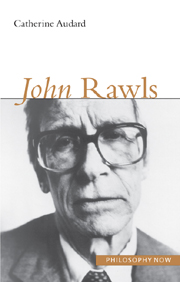Book contents
- Frontmatter
- Contents
- Acknowledgements
- Abbreviations
- Introduction
- 1 The primacy of justice
- 2 Constructing the principles of justice
- 3 Defending democratic equality: The argument from the Original Position
- 4 Pluralism and political consensus: The argument for political liberalism
- 5 A reasonable law of peoples for a real world
- Conclusion: Beyond liberalism
- Notes
- Bibliography
- Index
1 - The primacy of justice
- Frontmatter
- Contents
- Acknowledgements
- Abbreviations
- Introduction
- 1 The primacy of justice
- 2 Constructing the principles of justice
- 3 Defending democratic equality: The argument from the Original Position
- 4 Pluralism and political consensus: The argument for political liberalism
- 5 A reasonable law of peoples for a real world
- Conclusion: Beyond liberalism
- Notes
- Bibliography
- Index
Summary
Each person possesses an inviolability founded on justice that even the welfare of society as a whole cannot override.
(TJ:3)Introduction
What is characteristic about democratic societies? What is their ambition? Is it to increase welfare and prosperity or happiness or liberty or some other value? For Rawls, it is justice and equal respect for persons that is the main distinctive concern, a concern that overrides other legitimate values. “I have tried to set forth a theory that enables us to understand and to assess these feelings about the primacy of justice” (TJ: 513).
In this chapter, I explain the main philosophical thesis that is the backdrop for the primacy of justice.
I start with some remarks on the meaning of the concept of justice and on the distinctions made by Rawls at the beginning of A Theory of Justice and in his later work between conceptions, precepts and principles of justice. In particular, I explain the meaning for Rawls of a conception of justice as impartiality, as mutual advantage and as reciprocity and I discuss Brian Barry's interpretation of Rawls' two theories of justice (Barry, 1989: Ch. 4). I also explain why Rawls refers to Hume's analysis of “the circumstances of justice” (Hume, 1740: III).
In the following sections, I examine three different aspects of the priority of justice. In Section 2, I analyse in what sense Rawls' conception is deontological, that is, claims that justice is prior to the good and independent of it.
- Type
- Chapter
- Information
- John Rawls , pp. 25 - 78Publisher: Acumen PublishingPrint publication year: 2006



